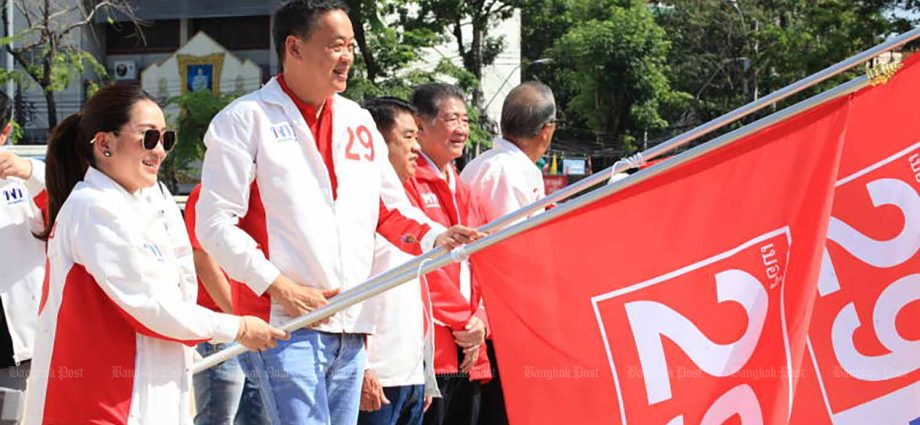PUBLISHED : 3 Sep 2023 at 10:52

Most people like the Pheu Thai Party’s policies but do not think all of them can be successfully implemented, according to the result of an opinion survey by the National Institute of Development Administration, or Nida Poll.
The poll was conducted on Aug 30-Sept 1 in telephone interviews with 1,310 people aged 18 and over of various levels of education, occupations and incomes throughout the country to compile their opinions on the policies of the Pheu Thai Party, the largest of the 11 parties in the coalition government under Prime Minister Srettha Thavisin.
Asked whether they wanted the following 10 of the Pheu Thai policies implemented, a majority of respondents said “yes”, ranging from a high of 87% for a moratorium on farmers’ debt repayments to a low of 58% for the abolition of conscription. The figures below do not include the small number who did not answer.
1. A 3-year moratorium on farmers’ debt payments – 87.25% said “yes”/ 7.33% said “no”
2. A minimum monthly income of 20,000 baht per family – 86.18% “yes”/ 7.94% “no”
3. A 10,000 baht digital wallet for all from 16 years old and higher – 83.36% “yes”/ 11.91% “no”
4. A 25,000-baht starting salary per month for bachelor’s degree graduates by 2027 – 80.08% “yes”/12.67% “no”
5. A people’s constitution – 78.80% “yes”/10.61% “no”
6. A state-run hospital for each of the 50 districts of Bangkok – 78.17% “yes”‘/10.76% “no”
7. A 600-baht daily minimum wage by 2027 – 78.09% “yes”/13.51% “no”
8. An election of governors in some pilot provinces – 73.51% “yes”/16.87% “no”
9. A 20-baht electric train fare for an entire route – 72.90% “yes”/ 13.97% “no”
10. Abolition of mandatory military conscription – 58.32% “yes”/34.66% “no”
Asked which of these policies they believed could be successfully implemented, however, the numbers of respondents saying “yes” were considerably lower:
1. A 3-year moratorium on farmers’ debt repayments – 68.62% said “yes”; 18.63% “no”; 12.75% uncertain; and 0.30% had no answer
2. A 10,000 baht digital wallet for all those at least 16 years old – 53.82% “yes”; 29.01% “no”; 16.87% uncertain; and 0.30% no answer
3. An election of governors in some pilot provinces – 52.98% “yes”; 27.86% “no”; 16.18% uncertain; and 2.98% no answer
4. A state-run hospital for each of the 50 districts of Bangkok – 50.15% “yes”; 28.63% “no”; 17.86% uncertain; and 3.36% no answer
5. A 20-baht electric train fare for an entire route – 48.09% “yes”; 30.15% “no”; 18.78% uncertain; and 2.98% no answer
6. A minimum monthly income of 20,000 baht per family – 40.31% “yes”; 40.31% “no”; 19.08% uncertain; and 0.30% no answer
7. Abolition of mandatory military conscription – 43.74% said “no”; 39.69% “yes”; 15.73% uncertain; and 0.84% no answer
8. A people’s constitution – 39.01% “yes”; 35.72% “no”; 23.51% uncertain; and 1.76% no answer
9. A 600-baht daily minimum wage by 2027 – 41.98% “no”; 37.18% “yes”; 20.46% uncertain; and 0.38% no answer
10. A 25,000-baht starting salary per month for bachelor’s degree graduates by 2027 – 41.14% said “no”; 36.64% “yes”; 21.76% uncertain; and 0.46% no answer.
The answers revealed that most of the respondents believed that of the 10 mentioned policies, five would be successfully implemented.
On the successful introduction of the minimum monthly income of 20,000 baht per family, the “yes” and “no” answers were the same at 40.31%.
However, most respondents did not believe or were uncertain that the policies on abilition of military conscription, a people’s constitution, a 600-baht daily minimum wage by 2027, and a 25,000-baht starting salary per month for bachelor’s degree graduates would be successfully implemented.

